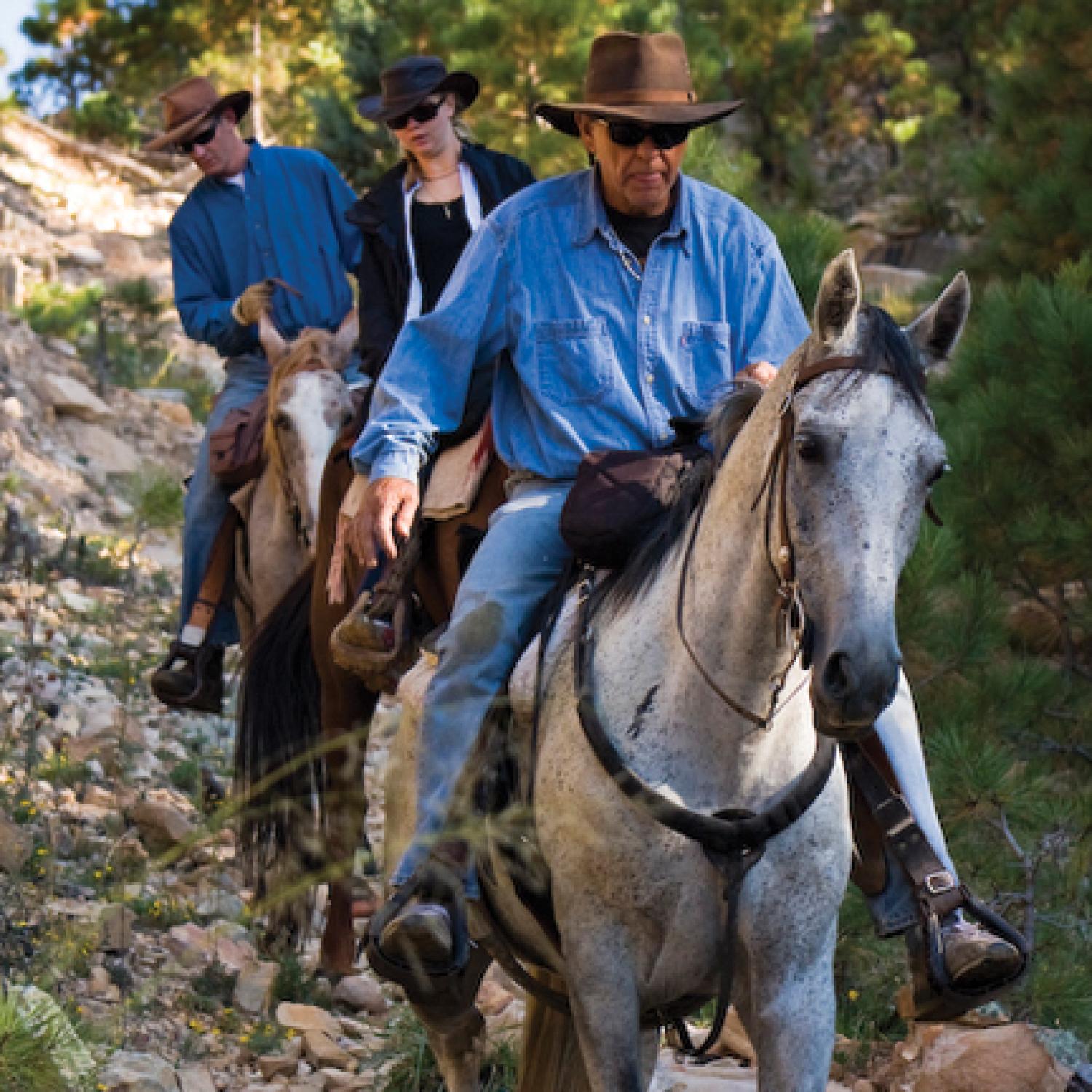
Horseback House Calls

Ken Jackson (DistSt’73) commutes eight miles down the Grand Canyon by horse to deliver prenatal care to Native American women.
If the cliché that doctors no longer make house calls is true, somebody neglected to tell Ken Jackson (DistSt’73).
One Friday a month, the family doctor who specializes in high-risk obstetrics loads his horse into a trailer at his home outside Kingman, Ariz., and drives 130 miles to the rim of the Grand Canyon. The horse carries him another eight miles to Supai, a community of about 400 at the base of the canyon more than 2,000 vertical feet below. Located in the Havasupai Indian Reservation, it is one of the most remote communities in the lower 48 states. The U.S. mail arrives by mule. It is only accessible to visitors by foot, horseback or helicopter.
During his 12-hour day, Jackson provides mostly prenatal care to six to 10 patients, not a business model typical in health care these days. So unique is his work that he has been featured in USA Today and the PBS documentary series,“Legends and Dreamers.”
Jackson, 63, has spent the past 37 years practicing medicine, mostly on or around Arizona Indian reservations. His trips to Supai might not be the best use of time, but his days are not about efficiency or business models.
“The real part of this job is about heart,” he says. “In the end, it’s that interaction between physician and patient. It’s not like it’s a mission or anything — it just happens to be my life. There’s a certain validation to it. It’s an adventure, very rewarding.”
Supai’s remoteness does not make it immune from such issues as teen pregnancy, drug and alcohol abuse and chronic disease that are common in Native American communities and reservations. Jackson’s patients range in age from those just conceived to 97. On house calls or at the Kingman Regional Medical Center, where he spends most days, Jackson deals with everything from vasectomies to ingrown toenails. But he specializes in delivering babies.
He estimates he has delivered more than 4,000 babies. Most deliveries are routine, but one of the most difficult sticks out in his mind and keeps him descending into the Grand Canyon.
On one of his first visits to Supai, he treated a pregnant woman who was diabetic and had other complications. He was able to get her aboard a helicopter and to Kingman where she had a successful delivery.
“That early trip was enough to justify me going in and out of there for years because it did make a difference,” he says.
Other challenges come along with his work in Supai, including occasional tribal politics and loose conceptions of time and organization, says Leah Goldie, Jackson’s nurse and medical assistant. But Jackson’s patient, caring approach overcomes most hurdles.
“Those girls are very quiet down there at the bottom of the Grand Canyon,” Goldie says. “But you can tell they’re comfortable with him.”
Perhaps it’s that his daily work uniform is jeans and a casual blue shirt. The Kingman Regional Medical Center had to change its bylaws to allow him to wear jeans. Or the fact that he sometimes doesn’t charge patients or that he quietly gives those in need money or food.
“It’s more like a family than a grist-mill of sore throats,” Goldie says. “He loves these patients. He’s what a doctor is supposed to be, and this is the way it’s supposed to work.”
Jackson’s dedication to his patients and his work earned him designation as the 2010 Country Doctor of the Year, an award that honors physicians who exemplify the spirit of rural doctors. It is presented by Staff Care, the largest physician staffing service in the country.
Despite the attention, Jackson, who spent his teen years outside Grand Junction, Colo., before attending CU-Boulder, tends toward introspection.
He has had plenty of time for it while driving the expanses of rural Arizona or on horseback, listening to classic rock on his iPod while on the trail to Supai. Additionally, he is one of few people alive to have traversed Arizona on horseback from border to border. During one several-month trip he crossed the state from north to south, and on another he went from east to west.
One result of his introspection is Manifest West (Treble Heart Books), a novel he wrote over several years that draws on Jackson’s experiences on the Apache Reservation. The suspense tale features Dr. Michael Ganson, whose agonizing decision to perform a high-risk cesarean on a dying Indian woman plunges him into the nightmare of a malpractice lawsuit motivated by powerful forces intent on destroying him.
“It allowed me to order my past, to take things personal to me and make them more universal,” he says. “I figured if I could get it past the doctors, get it past the lawyers and get it past the people on the reservation, I would have created something realistic. And from the feedback, that’s what happened.”
The book received good reviews and earned Jackson comparisons to American authors Zane Grey and Tony Hillerman. He’s several chapters into writing the sequel, Orion’s Daughter, named in part for the constellation that guides him home on many late nights from Supai.
As much as he enjoys writing, he doesn’t intend to quit his day job any time soon. As he approaches his fourth decade practicing medicine, Jackson says his experiences and the intrinsic rewards of the job motivate him to continue.
“I’m more capable emotionally of doing this now than ever,” he says. “The intellectual and emotional learning curves in this profession go on forever. They’re not as steep as you get older, but they continue to ascend to the infinite.”

